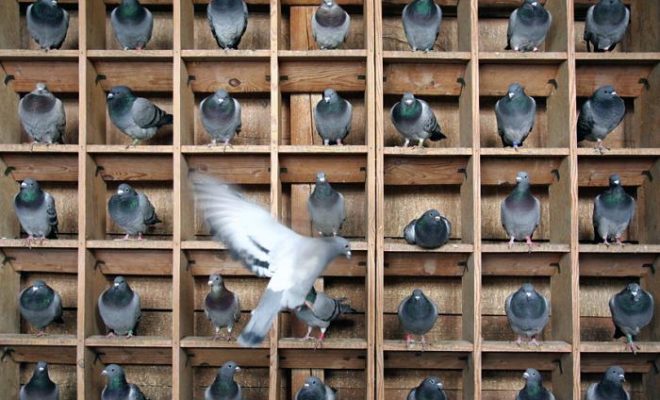
noun
- one of a series of small, open compartments, as in a desk, cabinet, or the like, used for filing or sorting papers, letters, etc.
- a hole or recess, or one of a series of recesses, for pigeons to nest in.
- Also called pigeon hole, white hole. Printing. white space created by setting words or lines too far apart.
verb (used with object), pi·geon·holed, pi·geon·hol·ing.
- to assign to a definite place or to definite places in some orderly system: to pigeonhole new ideas.
- to lay aside for use or reference at some later, indefinite time: We must pigeonhole this excellent plan until the time is ripe.
- to put aside for the present, especially with the intention of ignoring or forgetting, often indefinitely: to pigeonhole an unwanted invitation.
- to place in or as if in a pigeonhole or pigeonholes: to pigeonhole papers.
- to fit or provide with pigeonholes: The desk must be pigeonholed for all my papers.
noun
- a small compartment for papers, letters, etc, as in a bureau
- a hole or recess in a dovecote for pigeons to nest in
- informal a category or classification
verb (tr)
- to put aside or defer
- to classify or categorize, esp in a rigid manner
n.also pigeonhole, 1570s, “a small recess for pigeons to nest in,” from pigeon + hole (n.). Meaning “a compartment in a writing desk,” etc. is from 1680s, based on resemblance. The verb is from 1840 literally; figurative sense of “label mentally” is from 1870. [Y]ou will have an inspector after you with note-book and ink-horn, and you will be booked and pigeon-holed for further use when wanted. [“Civilisation–The Census,” “Blackwood’s Magazine,” Oct. 1854] Related: Pigeonholed.
 Liberal Dictionary English Dictionary
Liberal Dictionary English Dictionary